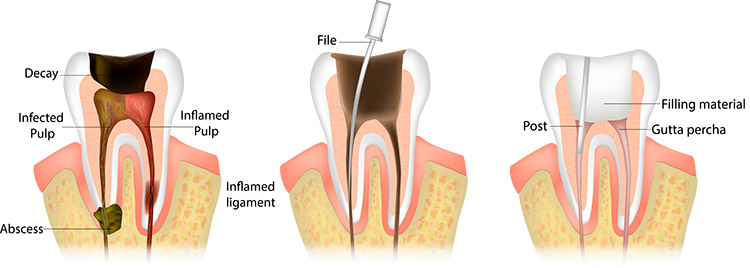
WHAT IS A ROOT CANAL TREATMENT?
Endodontic treatment or more commonly known as root canal treatment, is a dental treatment for necrotic (injured/dead) pulp. The pulp of the tooth is located in the centre of the tooth consisting of living tissues such as nerves, blood supply and connective tissues.
If left untreated, the infection will spread from the tooth to the surrounding tissue causing significant pain, swelling that may compromise breathing, sepsis and also eventual tooth loss.
The pulp may be injured either through:
- Decay
- Trauma that resulted in fracture of part of a tooth or knocked a tooth out of its socket
- Repeated extensive fillings
- Severe wear or grinding habit
- Gum disease
WHAT ARE THE SIGNS AND SYMPTOMS A TOOTH MAY HAVE INJURED OR DEAD PULP?
- Pain
- Swelling on jaw, face or gum adjacent to infected tooth
- Discoloured tooth
- Loose tooth
- Fistula or draining infection
- Tenderness on biting or chewing
- Sensitivity to hot and cold
What does the procedure involve?
During a root canal procedure, the dentist makes an opening through the tooth to the infected pulp. The pulp is removed, the inside of the tooth – the canal, is then cleaned, shaped and in the final visit, the canal is sealed with a root canal filling. This is done under local anaesthesia so the patient is comfortable. As each tooth has a different number of canals to be cleaned, the treatment will require multiple visits depending on which tooth is being treated. After the initial visit, the tooth will be temporarily sealed so the patient is able to function as normal throughout the duration of the treatment.



ARE ROOT CANAL TREATMENTS SUCCESSFUL?
There is a high success rate of more than 90% in most cases of root canal treatment. The initial assessment of the existing condition of the tooth and correct diagnosis of the cause of the infection, are keys to the success.
Complications such as procedural error, where the instrument used in the cleaning of canal may fracture, or a cracked tooth where the tooth may not be salvageable, often reduced the chance of success.
Root canal treated teeth may also fail years after treatment was completed. This is often due to missed canal(s) where infected pulp tissue may have been left behind. This will require specialist endodontist management, where with the help of an operating microscope, will be able to retreat the tooth. However, the success rate in cases of retreatment are often reduced due to significant weakening of the tooth during retreatment.
We understand that endodontic treatment is a complex, time-consuming and a costly treatment. Your dentist will discuss the complications that may arise in your course of endodontic treatment and explore all the treatment options available, prior to commencement of treatment.
